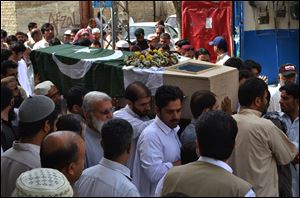
Gunmen in Pakistan kill 2 anti-polio workers
6/16/2013
People carry the flag-wrapped casket of a high-ranking government official who was killed in Saturday's bombing at the Bolan Medical complex in Quetta, Pakistan, Sunday, June 16, 2013. The radical Lashkar-e-Jhangvi group claimed responsibility for the attacks on the hospital and a women's university bus.
PESHAWAR, Pakistan — Gunmen killed two anti-polio workers Sunday in northwest Pakistan, police said, the latest violence directed at efforts to eradicate the disease from the country.
The two attackers shot the two Pakistani health workers while they were on a vaccination drive in rural Kandar village, said Swabi District Police Chief Mohammad Saeed. The gunmen arrived on foot and later disappeared, he added.
No one claimed responsibility for the Sunday attack. But some Pakistani militant groups oppose the vaccinations and accuse the workers of spying for Washington. They point out the case of a Pakistani doctor used by the CIA to collect blood samples of the family of Osama bin Laden in order to track him down and kill him in Pakistan in 2011.
Islamic militants also try to block inoculation campaigns by portraying them as a conspiracy to sterilize and reduce the world’s Muslim population. Over the past year, nearly 20 health workers from the anti-polio campaign have been killed.
Pakistan is one of the world’s three remaining countries, along with Afghanistan and Nigeria, still affected by the polio virus. As many as 58 cases were reported here in 2012, down from 198 in 2011.
The World Health Organization said in late March that some 240,000 children have missed U.N.-backed vaccinations against polio because of security concerns in Pakistan’s tribal regions bordering Afghanistan. It said the health workers have not been able to immunize children in the North and South Waziristan regions — Taliban strongholds — since July 2012.
The shootings came a day after a Pakistani al-Qaida-linked militant group, Lashkar-e-Jhangvi, killed 24 people in the southwestern city of Quetta.
In the first of Saturday’s attacks in Quetta, a blast ripped through a bus carrying female students, killing 14.
When the victims were taken to the nearby hospital, a suicide bomber struck there. Other attackers captured parts of the complex, triggering a siege by security forces in which four paramilitaries also died.
Lashkar-e-Jhangvi claimed responsibility for the attacks. Six attackers also died in the siege.
Most of Quetta remained shut Sunday in mourning. On a visit to the city, Interior Minister Chaudhry Nisar Ali Khan promised to find and punish the culprits.
The Pakistan Muslim League-N party, of which both he and Prime Minister Nawaz Sharif are members, has pledged to bring peace to the country by holding negotiations with homegrown militant groups like the Pakistani Taliban.
Khan said the peace dialogue was still open but only for those groups who were willing to end violence. “We will hold dialogue with those who are willing to do that,” he said. “Those who only want to stick to militancy and terrorism — they will get the same treatment.”
____
Associated Press Writer Abdul Sattar in Quetta contributed to this report.